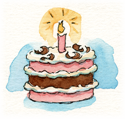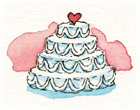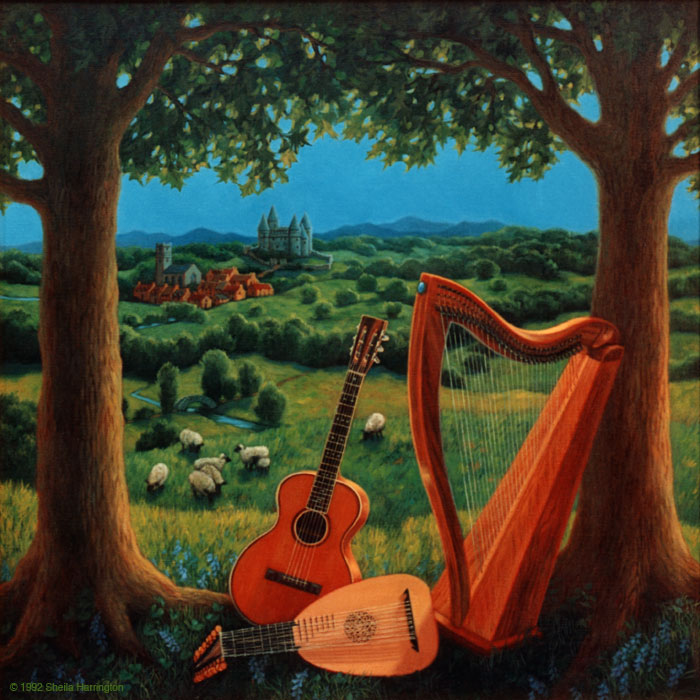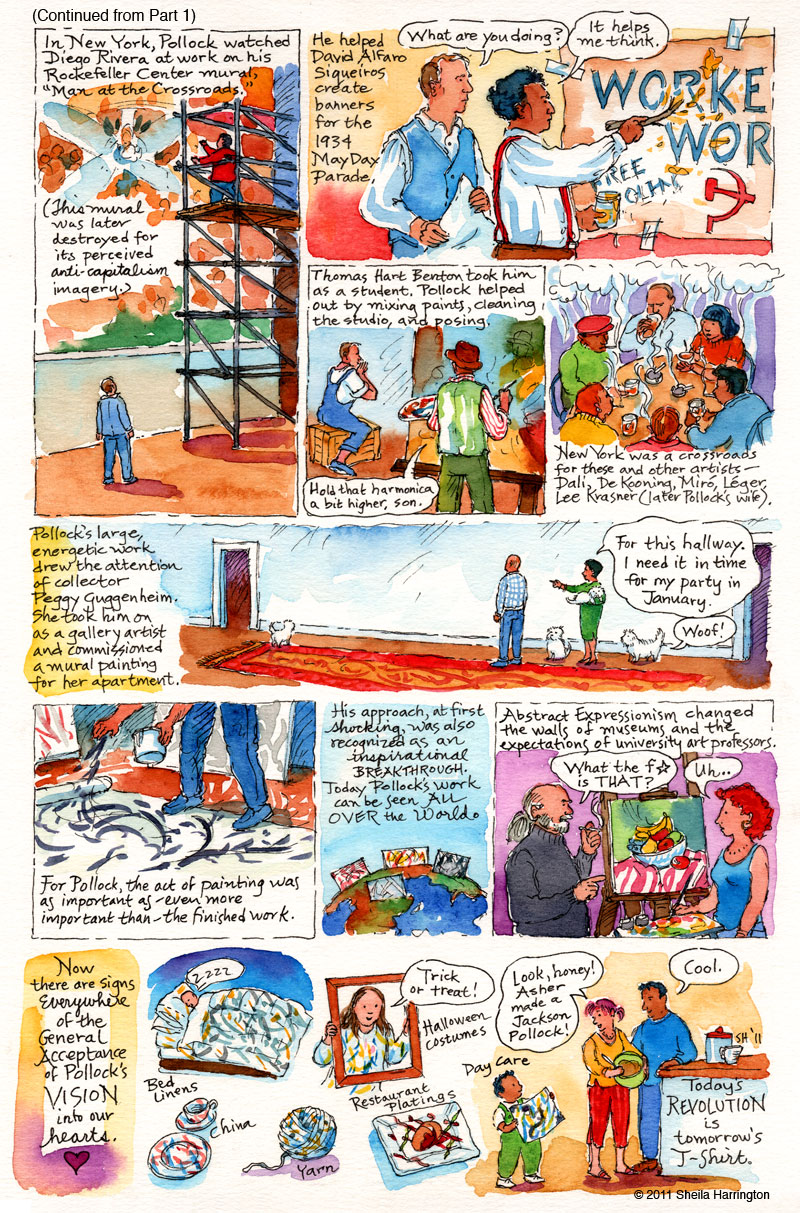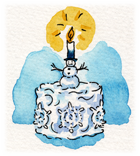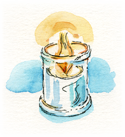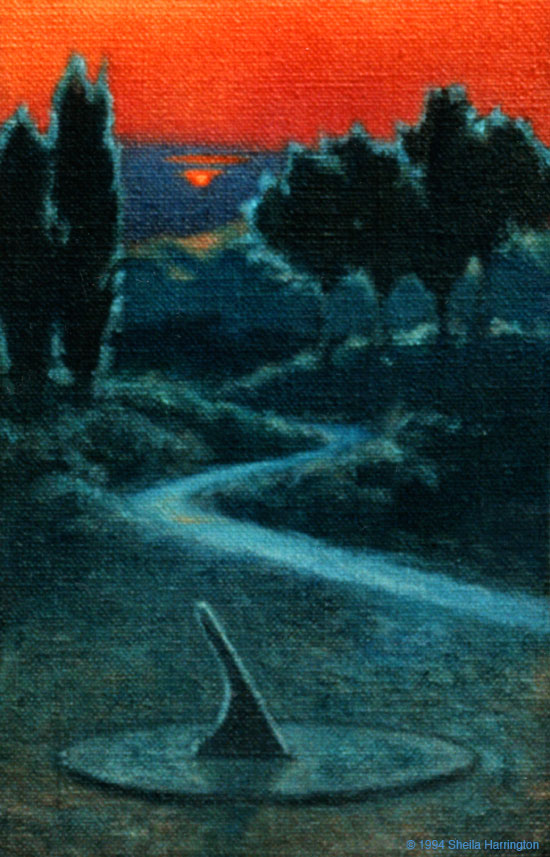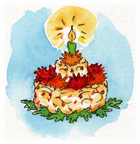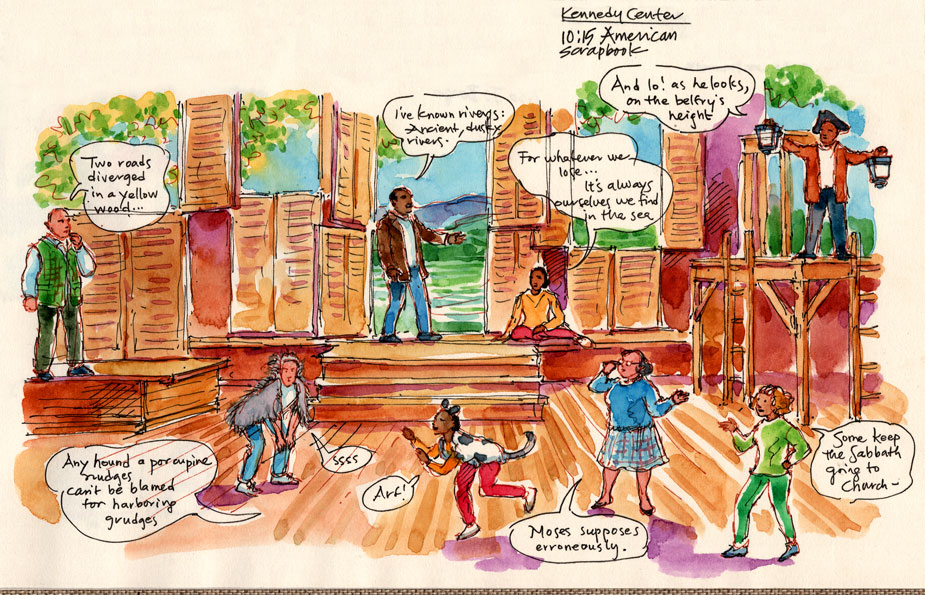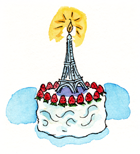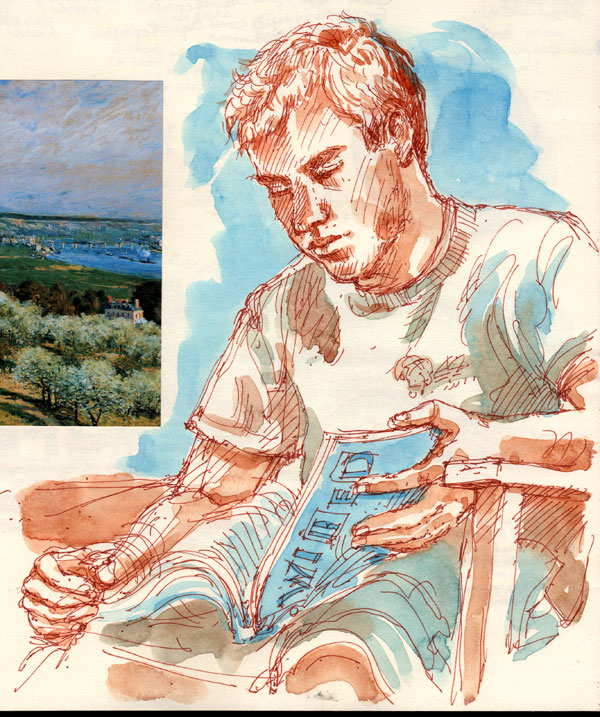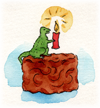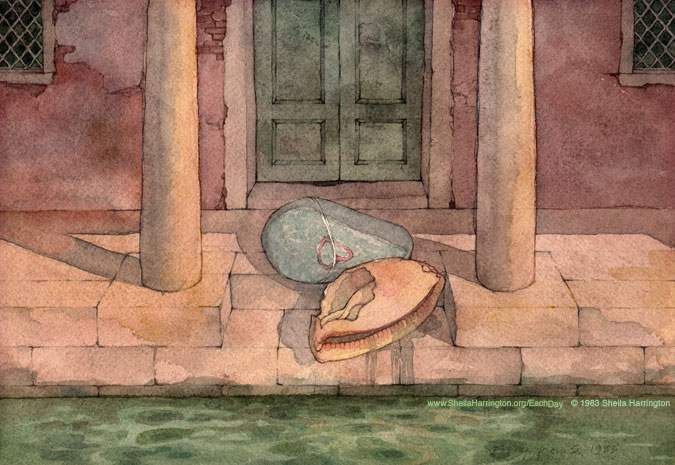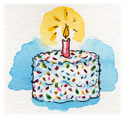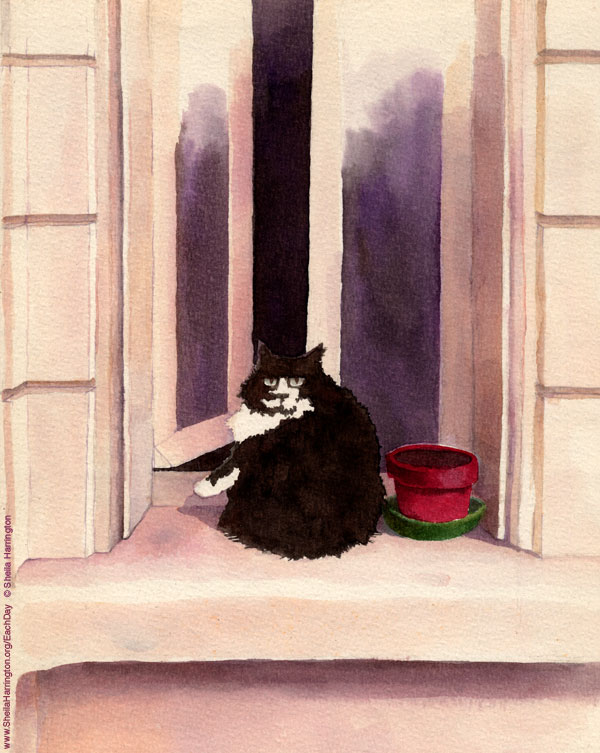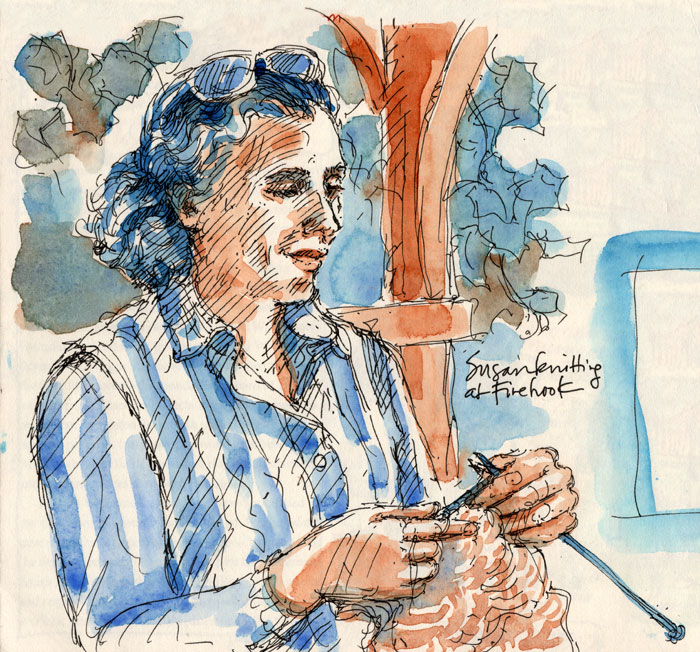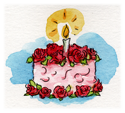It’s actually on the 29th. They only celebrate their anniversary every four years.
Month: February 2011
Come Live With Me and Be My Love
Although the imagery isn’t exactly appropriate for the weather, I post this verse and accompanying painting in honor of the baptismal date (his actual birthdate is unknown) of Christopher Marlowe (1564-1593), poet, playwright, freethinker, and influential contemporary of Shakespeare. Anyway, March is just around the corner, so pretty lambs and melodious birds cannot be far off.
The combination of Marlowe’s successful career, yawning gaps in the biographical record, and early mysterious death in a tavern brawl have led to much speculation about his love life, religious views, and supposed alternate career as a government spy. I can’t think why his story hasn’t yet been made into a swashbuckling PBS mini-series.
Come live with me and be my love, And we will all the pleasures prove That valleys, groves, hills, and fields, Woods or steepy mountain yields.And we will sit upon the rocks, Seeing the shepherds feed their flocks, By shallow rivers to whose falls Melodious birds sing madrigals.
And I will make thee beds of roses And a thousand fragrant posies, A cap of flowers, and a kirtle Embroidered all with leaves of myrtle;
A gown made of the finest wool Which from our pretty lambs we pull; Fair lined slippers for the cold, With buckles of th purest gold;
A belt of straw and ivy buds, With coral clasps and amber studs: And if these pleasures may thee move, Come live with me and be my love.
The shepherds’ swains shall dance and sing For thy delight each May morning: If these delights thy mind may move, Then live with me and be my love.
—Christopher Marlowe
The painting above was created for the cover of a CD, The Sylvan Court.
Action Jackson Part 2
Continued from Action Jackson Part 1
So how did a guy born in Cody, Wyoming who grew up mostly in Arizona and California and studied under Thomas Hart Benton (of all people!) end up as a leading New York figure in Abstract Expressionism, the first major made-in-America artistic movement? Well, that is one of the Mysteries of Art. Perhaps it required a sensitive, moody, depressed, violent, tormented, socially inept alcoholic—someone connected by the thinnest of threads to all that stuff so important to the rest of us—to throw off the last vestiges of representation and rip the painting from the easel (actually, right off the wall altogether) for its completely non-referential expression, to be fully about itself. (At least in its final state. Pollock himself acknowledged that he began a painting with representational imagery, albeit skeletal, which eventually became obscured in the process.)
Also, timing is everything. History is full of sensitive moody depressed people who never launched an art movement, or anything else, and if one of them had started flinging paint around he would have been institutionalized rather than invited to give a one-man exhibit at the Guggenheim.
A Pollock in reproduction is a mere footnote to the actual work. Personal experience of its scale and physicality are critical to appreciation and understanding of its active surface and sense of immense depth. If full understanding is actually possible. Standing before it is an odd experience, at once overwhelming, intimate, and liberating. The powerful presence of the paint, presumably devoid of pictorial illusion, nevertheless sucks the viewer in, at once baldly honest (it’s only paint) and limitlessly suggestive (of raw energy, recklessness, fury, joy, the starry firmament, the birth of the universe!). Its material immediacy combined with its non-objectivity transforms the viewer into a participant who simultaneously sees and re-creates the painting. It’s interactive art.
Pollock was at his most stable and exalted (I can’t say “happiest”) while painting. Between phases of work he was tormented, despairing, self-destructive to the point that his sad end in an automobile accident may actually have been an act of suicide. But his work, which a therapist had once suggested might help relieve his pain, had probably extended his life.
Reflect on the geniuses you know. Aren’t they famously troubled, eccentric, even downright unpleasant? Ah, and yet we forgive them, because they have opened a door to a new way of perceiving, when we hadn’t even realized there was a wall blocking our view.
The Deep River Ran On
Today is the birthday of W.H. Auden (1907-1973), and it is in his honor that I post this rather melancholy but very beautiful poem.
This day is also the 125th anniversary of the dedication in 1885 of the Washington Monument, so for an illustration and mini-history, please see Washington’s Monument.
As I walked out one evening, Walking down Bristol Street, The crowds upon the pavement Were fields of harvest wheat.And down by the brimming river I heard a lover sing Under an arch of the railway: ‘Love has no ending.
‘I’ll love you, dear, I’ll love you Till China and Africa meet, And the river jumps over the mountain And the salmon sing in the street,
‘I’ll love you till the ocean Is folded and hung up to dry And the seven stars go squawking Like geese about the sky.
‘The years shall run like rabbits, For in my arms I hold The Flower of the Ages, And the first love of the world.’
But all the clocks in the city Began to whirr and chime: ‘O let not Time deceive you, You cannot conquer Time.
‘In the burrows of the Nightmare Where Justice naked is, Time watches from the shadow And coughs when you would kiss.
‘In headaches and in worry Vaguely life leaks away, And Time will have his fancy To-morrow or to-day.
‘Into many a green valley Drifts the appalling snow; Time breaks the threaded dances And the diver’s brilliant bow.
‘O plunge your hands in water, Plunge them in up to the wrist; Stare, stare in the basin And wonder what you’ve missed.
‘The glacier knocks in the cupboard, The desert sighs in the bed, And the crack in the tea-cup opens A lane to the land of the dead.
‘Where the beggars raffle the banknotes And the Giant is enchanting to Jack, And the Lily-white Boy is a Roarer, And Jill goes down on her back.
‘O look, look in the mirror, O look in your distress: Life remains a blessing Although you cannot bless.
‘O stand, stand at the window As the tears scald and start; You shall love your crooked neighbour With your crooked heart.’
It was late, late in the evening, The lovers they were gone; The clocks had ceased their chiming, And the deep river ran on.
—W. H. Auden
American Scrapbook
Unbelievably, it has been FIFTY YEARS since the inauguration of John F. Kennedy, and in honor of this anniversary the Kennedy Center here in Washington, DC has created a blockbuster lineup of events. Both President and Jacqueline Kennedy were enthusiastic supporters of the arts, so the celebration includes a bounteous variety of musical, theatrical, and dance performances, some ticketed and some free of charge. It is, after all, the Kennedys who helped bring to fruition a long-languishing plan for a National Cultural Center, which was renamed the Kennedy Center after Kennedy’s assassination in 1963.
Whatever you may think of its architectual style, you must acknowledge that it’s been a fantastic addition to the Washington cultural scene all these years, providing a setting for a huge range of artistic performances (including Millennium Stage, with 365 free performances a year!) and inspiring the launch of many additional venues. And it has a lovely view from the terrace. Anyway, we’re all used to it now, as a familiar icon for which we feel affection, like some eccentric great-aunt who is known for her peculiar hats.
As part of a homeschoolers’ outing, my daughter and I attended American Scrapbook, A Celebration of Verse, a theatrical interpretation of some of the Kennedys’ favorite poetry. The family had a lovely tradition which (WARNING) will assuredly make you long to go back and raise your semi-literate, poetry-impaired children all over again: for the parents’ birthdays, the children Caroline and John Jr. each chose poems and then created drawings to accompany them, which were then pasted into a scrapbook.
This scrapbook collection inspired the play, which was essentially a seamlessly interwoven, thematically arranged series of “recitations”—although I hesitate to use that dry schoolhouse term, because the interpretations were so engaging and heartfelt. (I tried to sketch, but it was pretty dark and the actors were awfully “active,” thus the rough, scribbled result.)
The set was simple, modest, effective: tall wooden shutters that opened and closed in a variety of configurations to reveal changing images that supported, rather than distracted from, the spoken word.
Lively, imaginative, yet true to the spirit of the poems, the program transfixed the audience of elementary and middle-school children for an hour, which, when you’re talking about poetry, is truly a laudable achievement.
Sense Of Something Coming
Here is a sketch, from a few years ago, of my son at leisure. He is now leading a busy life teaching, writing, and painting, and is gifted for all three, yet restlessly wondering what lies around the next corner. For his birthday today I post this poem. Happy Birthday, dear Devin, and take heart.
I am like a flag in the center of open space. I sense ahead the wind which is coming, and must live it through. while the things of the world still do not move: the doors still close softly, and the chimneys are full of silence, the windows do not rattle yet, and the dust still lies down.I already know the storm, and I am troubled as the sea. I leap out, and fall back, and throw myself out, and am absolutely alone in the great storm.
—Rainer Maria Rilke
The Song of Wandering Aengus
For Valentines Day.
I went out to the hazel wood, Because a fire was in my head, And cut and peeled a hazel wand, And hooked a berry to a thread;And when white moths were on the wing, And moth-like stars were flickering out, I dropped the berry in a stream And caught a little silver trout.
When I had laid it on the floor I went to blow the fire aflame, But something rustled on the floor, And some one called me by my name: It had become a glimmering girl With apple blossom in her hair Who called me by my name and ran And faded through the brightening air.
Though I am old with wandering Through hollow lands and hilly lands, I will find out where she has gone, And kiss her lips and take her hands; And walk among long dappled grass, And pluck till time and times are done The silver apples of the moon, The golden apples of the sun.
—William Butler Yeats
This image is available as a high-resolution print on 8.5″ x 11″ archival paper.
Cats
This rather fierce-looking cat is Minou, the spoiled darling of the concierge, painted in our long-ago Paris days. Minou is undoubtedly long gone, but she pretty much ruled the roost while she was around. I post her portrait here, along with this poem, in honor of Eleanor Farjeon (1881-1965), whose birthday it is today. For a brief bio of the delightful Farjeon, another of her poems, and a painting, please see Morning Has Broken.
Cats sleep Anywhere, Any table, Any chair, Top of piano, Window-ledge, In the middle, On the edge, Open drawer, Empty shoe, Anybody’s Lap will do, Fitted in a Cardboard box, In the cupboard With your frocks – Anywhere! They don’t care! Cats sleep Anywhere.—Eleanor Farjeon
Magic Hands
Here is friend and neighbor Susan, whose birthday it is today, and who, in all the years I have known her, rarely appears anywhere (except perhaps the theater) without a bag containing at least one current knitting project. Over the years I’ve watched beautiful pieces flow from her talented hands, destined for family, friends, or strangers in need: scarves, hats, sweaters for all ages, socks, and blankets—including a beautiful off-to-college afghan for her daughter Sara made of leftover scraps from years of Sara’s knitted garments. Each square carried distinct memories. At a recent gathering, we discovered that most of us happened to be wearing scarves Susan had made for us.
Her knitting alone might be a sufficient lifetime achievement, but Susan is also a rich literary and artistic resource, an endlessly interested and enthusiastic traveler through the world and through life, a doting mother, a fabulous cook, and a fun, funny and generous friend and human being. Happy, happy birthday, Susan, and many more to come!

